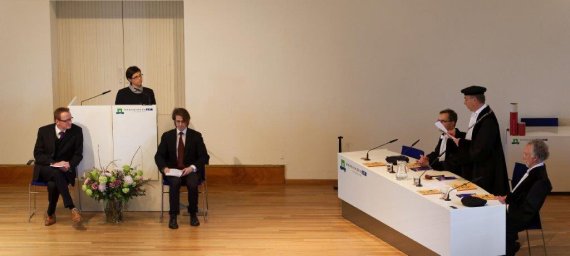A thesis defence ceremony in the Aula of Wageningen University. © Guy Ackermans
In contrast to countries such as Belgium and German, the Netherlands only allows professors to grant PhD candidates a doctorate. However, a change in legislation that was passed by the Dutch Senate on Tuesday 6 June will soon change that. It will then be possible for Dutch universities to assign other staff holding a PhD as promotor.
We were basically lagging behind in the Netherlands
Rector Magnificus Arthur Mol
Mol agrees with this change. ‘We were basically lagging behind in the Netherlands’, he says. The decision still needs to be taken within WUR, but the rector estimates that the new rules can come into effect in Wageningen from 1 January 2018. ‘One and a half year ago, in the run-up to this change, we already talked with the people concerned. At the time, we came to the conclusion that basically anyone with a UHD1 appointment in a tenure track should have the right to grant a doctorate.’
In some exceptional cases, Wageningen University will probably also give the right to grant a doctorate to staff members without UHD1 appointment, says Mol. ‘An assistant professor with their own line of research and a lot of supervising experience, for example, could very well take on the part of promotor earlier in their career. On the other hand, someone with a UHD1 appointment who only teaches and has no experience supervising PhD candidates should perhaps not be given this right. The Doctorate Board will have to take a decision on the subject at a later stage. This board can theoretically already decide when a professor is not allowed to be a promotor.’
Maarten Smulders, chair of the Wageningen Young Academy and himself assistant professor in the Organic Chemistry group, has a positive outlook on the change. ‘It is peculiar that a scientist who arranges his own funds for research and supervises PhD candidates could until now merely be a copromotor. I don’t think it would be bad to provide a bit of acknowledgement for the true part that somebody plays. This would also be clearer to institutes abroad, which could be important to someone’s career.’
What is most important to us is for the quality of supervision to be maintained. Whether somebody is a professor or not has nothing to do with that
Birgit Dekkers, Chair Wageningen PhD Council
Birgit Dekkers, chair of the Wageningen PhD Council – a consultative body for PhD candidates, also agrees with the legislative change. ‘What is most important to us is for the quality of supervision to be maintained. Whether somebody is a professor or not has nothing to do with that.’
For professors, this change would mean a limitation of the part they play. In the current situation, they often act as promotor without having done much supervision. However, according to Mol, they have not voiced against the change either. When asked whether the changes would mean that he might not be the promotor of his own PhD candidates, Mol pauses. ‘Well, maybe for… No, I don’t think that anything will change for me.’
Additional reading (in Dutch):
Nieuw promotierecht ongeschonden door Eerste Kamer

